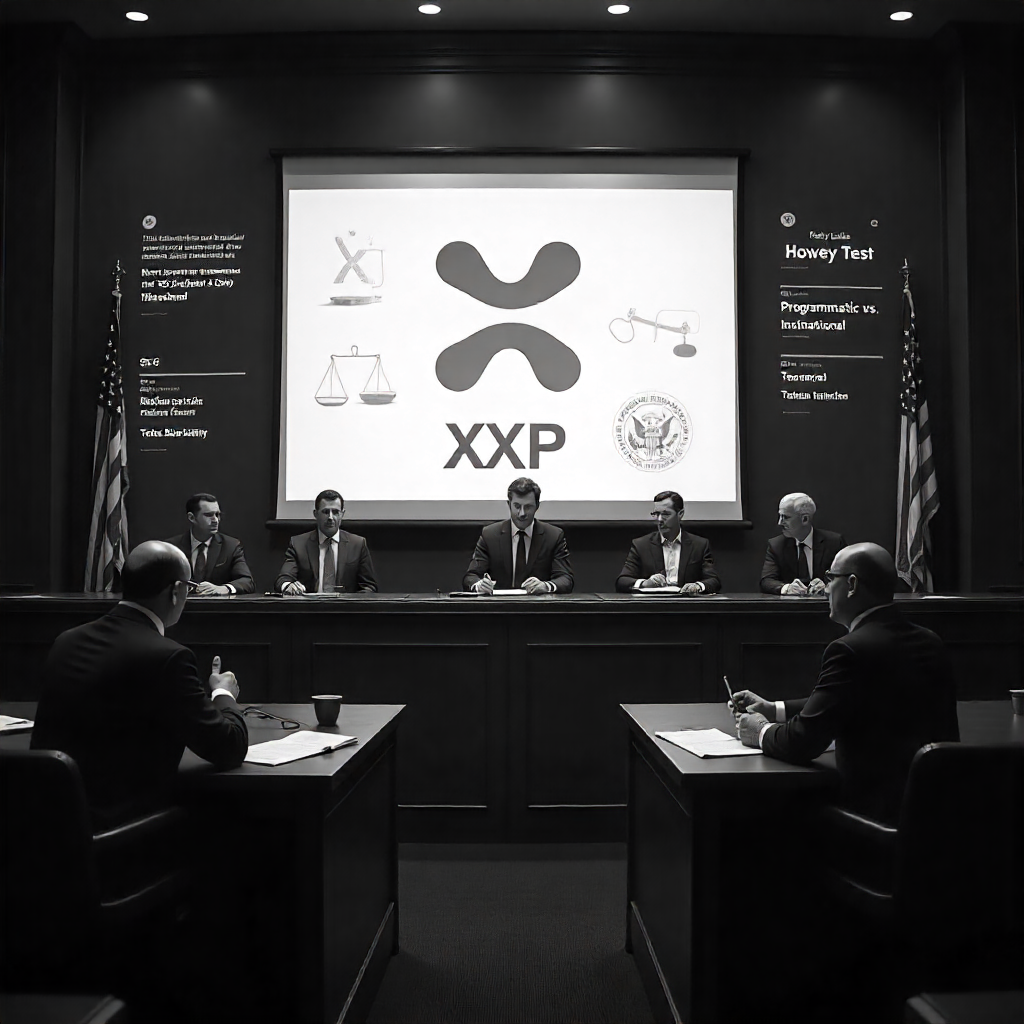The Ripple appeal marks a turning point in crypto law. Legal experts and crypto attorneys aim to understand it. The Ripple appeal brings clarity on how the Howey Test applies to digital assets. It could establish firm legal precedent for classifying tokens as securities—or not. The Ripple appeal also shapes how future token sales must be structured. Its outcome will influence global regulatory approaches, setting a benchmark that other jurisdictions may reference or react to. The case’s high profile ensures its impact will be felt far beyond U.S. borders.
In this piece, we walk you through the pivotal Second Circuit review of SEC v. Ripple. We’ll cover how the Ripple appeal revisits the Howey Test, scrutinizing its adaptation to decentralized, blockchain-based assets. We’ll explain the court’s focus on institutional versus programmatic sales and the crucial distinctions drawn between direct offerings and secondary market transactions. We’ll explore the heavy stakes: this Ripple appeal could rewrite crypto enforcement across the U.S., potentially forcing a fundamental reassessment of how thousands of existing tokens are regulated.
If you work in compliance, represent issuing projects, or counsel trading platforms, this Ripple appeal changes everything. It promises to clearly define when token offerings trigger securities laws, impacting fundraising strategies and exchange operations alike. You’ll see why this Ripple appeal matters now more than ever—as the industry seeks regulatory certainty—and what legal teams should do next to mitigate risk and ensure operational continuity.
Key Issues on Appeal
De Novo Review of Programmatic Sales
The SEC argues the district court wrongly exempted programmatic XRP sales. Ripple sold XRP on exchanges anonymously. The SEC contends buyers still expected profits linked to Ripple’s efforts, regardless of anonymity. They say these blind sales still meet Howey’s profit expectation prong, emphasizing the promotional activities and market messaging surrounding XRP. Ripple counters that anonymous buyers had no direct relationship or specific profit expectation tied solely to Ripple’s actions, viewing XRP purchases as akin to commodities trading. This argument over buyer knowledge and reliance is central to the Ripple appeal.
Ecosystem Theory of Token Value
The SEC claims all XRP sales benefited from Ripple’s wider ecosystem, including its technology development, partnerships, and marketing. They argue that this system-wide effort inherently supports classifying *all* XRP sales as securities, irrespective of the sale method. This taps into a novel and controversial “ecosystem” approach to applying Howey. Lower courts have diverged significantly: some embrace it broadly; others push back, demanding a more direct link between buyer expectation and specific promoter efforts. The Ripple appeal will critically test whether ecosystem-linked profits alone qualify transactions as securities.
Due Process and Fair Notice Challenges
Ripple argues the SEC’s use of the Howey Test lacked grounded, consistent guidance applicable to the novel context of digital assets. They assert the SEC’s shifting position on token classifications over time violated Ripple’s due process rights by failing to provide fair notice of what conduct was prohibited. The district court disagreed, finding sufficient legal framework existed. Now the Second Circuit must evaluate whether constitutional standards for legal notice and procedural fairness were truly met, a decision impacting all future SEC enforcement actions in crypto.
Parallel Howey Review in Coinbase Appeal
The Ripple appeal aligns with a parallel legal fight in the Coinbase case. In January 2025, Judge Failla granted an interlocutory appeal in SEC v Coinbase. That appeal also centers on Howey’s application to crypto, specifically whether trading on an exchange platform constitutes an “investment contract.” Both cases hinge on “substantial ground for difference of opinion” regarding ecosystem reasoning and the classification of secondary market transactions. Combined, they could result in a comprehensive Second Circuit ruling that harmonizes or further complicates the legal landscape for token trading.
Legal Stakes and Potential Outcomes
Uphold Ripple’s Institutional vs Retail Divide
If the court affirms the split decision, institutional XRP sales remain securities. Programmatic sales on exchanges stay exempt from securities registration. This outcome would significantly narrow Howey’s reach in the context of secondary market crypto trading. Exchanges and token issuers might largely avoid complex registration requirements for retail sales conducted on open platforms. It would offer much-needed legal clarity backed by binding appellate precedent, potentially stabilizing the market.
Broaden the Howey Test
If the SEC wins, all XRP sales—retail and institutional—could qualify as securities transactions. That would demand immediate registration from exchanges (as national securities exchanges or ATSs), issuers, and brokers dealing in XRP and similar tokens. It would effectively reclassify vast numbers of tokens, triggering sweeping regulatory obligations overnight. Token sales across U.S. platforms may halt pending costly and time-consuming compliance restructuring. A reversal could dismantle the district court’s carefully constructed framework and radically reshape token classification nationwide.
Adjust Fine and Injunction
Judge Torres imposed a $125 million penalty and halted institutional XRP sales without registration. A Ripple victory on appeal could substantially reduce or even eliminate both measures, freeing the company from ongoing restrictions. Conversely, an SEC-favorable ruling solidifies the current sanctions and opens the door to potentially heavier penalties on remand. Should the SEC drop its appeal before a ruling, the injunction and fee remain, but broader implications for the industry would stall. Many expect regulatory strategy changes under incoming SEC leadership; some predict the SEC will strategically withdraw to avoid setting adverse precedent.
Risk of Binding Precedent
A definitive ruling favoring the SEC creates binding case law across the influential Second Circuit, covering New York and major financial centers. Future cases—like Coinbase and countless others—would be compelled to follow suit. A Ripple win would carve out a significant exemption for programmatic sales, profoundly affecting future SEC enforcement priorities and legislative/regulatory policy design. Ripple risks industry-wide backlash if it pursues appeal and loses, potentially triggering stricter regulation for all. But dropping the appeal means permanently accepting the current penalty and legal limitations.
Supreme Court Certiorari Potential
Should the Second Circuit’s decision be particularly significant, novel, or deeply contested, the Supreme Court may be petitioned for review (Certiorari). However, the Second Circuit’s ruling will likely steer regulatory clarity for years regardless. The ripple effects of this case extend far beyond XRP itself. It may definitively determine whether a vast swath of digital assets fall under U.S. securities laws, impacting innovation, capital formation, and market structure globally.
Industry and Regulatory Ramifications
Exchanges and Token Issuers
The Ripple appeal will determine registration obligations. If programmatic XRP sales qualify as securities, exchanges must register as brokers, dealers, or potentially national securities exchanges. This would impose strict, costly compliance burdens including capital requirements, surveillance systems, and detailed reporting. Issuers may need to treat tokens as securities indefinitely. That means ongoing disclosure (like Form 8-Ks), independent audit, and rigorous record‑keeping obligations. A ruling favoring Ripple limits these requirements primarily to direct institutional offerings. That keeps a significant portion of the token market less regulated, fostering continued exchange operation under money services frameworks. The potential for market fragmentation or reduced U.S. exchange liquidity is a major concern under an SEC win scenario.
U.S. Regulatory Policy Shifts
Ongoing around-round regulatory developments are intrinsically linked to the Ripple appeal. Since January 2025, the SEC under new leadership launched a Crypto Task Force and began hosting public rule‑making roundtables rather than relying primarily on litigation. The agency has already dropped its lawsuits against Coinbase executives and paused other enforcement actions, signaling a potential strategic pivot. A Ripple victory would significantly bolster this shift toward proactive rule‑making instead of retroactive enforcement actions based on traditional securities laws. That could steer the SEC to accelerate efforts to formalize clear, token‑specific regulations through the notice-and-comment process.
Broader Legal Precedent
This is a pivotal legal turning point. The Ripple appeal could set a binding standard within the influential Second Circuit, whose decisions carry substantial weight nationally. That standard would affect not just XRP but all functionally similar tokens traded on exchanges. It will guide future SEC enforcement strategies and deeply influence how U.S. courts treat digital assets in civil and potentially criminal contexts. A ruling that insists on an ecosystem‑based interpretation may extend securities treatment to tokens previously considered commodities. If Ripple wins, it could carve out a lasting exemption for programmatic sales, creating a durable safe harbor for secondary market activity.
U.S. Administration and Political Landscape
The Ripple appeal doesn’t exist in a vacuum. The Trump administration has demonstrably shifted toward crypto‑friendly policies, seeking innovation leadership. President Trump’s executive order created a strategic Bitcoin reserve and pushed for a pro‑innovation SEC stance. Frank Crenshaw, the lone Democratic SEC commissioner, has consistently criticized the agency’s enforcement-centric approach as unstable “regulatory Jenga,” advocating for congressional action instead. A Ripple win would strongly align with the administration’s deregulatory agenda, validating its stance. A loss could trigger urgent calls within Congress for clearer, stricter token oversight via legislative action, potentially accelerating bills like the FIT for the 21st Century Act.
Call to Action for Crypto Attorneys
The Ripple appeal demands proactive legal preparation. Key actions ensure readiness no matter the outcome, mitigating disruption for clients.
Start preparing now. Update internal client advisories and templates on how token sales may be treated under securities law. Analyze current institutional and retail sale practices, identifying potential vulnerabilities under both possible rulings. Consider cross-border compliance implications if U.S. rules diverge significantly.
Enhance compliance programs immediately. Ensure firm disclosures align with potential securities guidance. Review marketing materials and sales processes to confirm institutional offers include proper documentation and investor verification. Prepare detailed contingency policies for handling programmatic sales depending on the appellate outcome.
Engage regulators proactively. Monitor the Second Circuit docket closely for filings and oral argument schedules. Submit thoughtful comments to public rule‑making efforts, especially through the new SEC Crypto Task Force. Advocate clearly for objective, predictable guidelines around token classification and exchange obligations.
Support active litigation strategy. For clients in disputes or under investigation, create persuasive position papers focused on the Howey factors, tailored to their specific token and sale structure. Highlight factual distinctions between retail and institutional offerings, emphasizing buyer sophistication and informational access. Cite Ripple’s original essential‑ingredients argument regarding the necessity of a direct contractual undertaking, even though the district court rejected it, as it may find traction on appeal.
Plan comprehensively for both outcomes. If Ripple wins, focus advice on leveraging compliance exemptions for programmatic sales and navigating the continued institutional sale restrictions. If SEC wins, urgently advise clients on broker‑dealer registration pathways, exchange registration complexities (ATS vs. full exchange), and audit readiness programs. Clients must understand precisely how to pivot operations swiftly.
Build thought leadership and client trust. Publish detailed, timely memos analyzing the Ripple appeal ruling as soon as it drops. Outreach proactively to industry trade groups (e.g., Chamber of Digital Commerce, Blockchain Association) to coordinate messaging. Lead client webinars and industry panels on how policies, tokenomics, and platform operations should strategically shift post‑Ripple appeal.
Final Reflections
The Ripple appeal stands as a defining moment in crypto law. The Second Circuit could affirm the mixed decision, maintaining that programmatic XRP sales are not securities while institutional sales remain regulated, thus embedding a clear legal precedent distinguishing sales methods. That outcome would validate a significant portion of current exchange operations.
Alternatively, a ruling favoring the SEC would dramatically broaden the Howey Test to include anonymous, exchange-based token sales, triggering sweeping registration and compliance requirements for exchanges, issuers, and brokers, fundamentally altering the U.S. crypto market structure. Either path decisively reshapes regulatory enforcement for the foreseeable future.
The SEC’s earlier withdrawal of its initial appeal on programmatic sales suggests shifting priorities under new leadership, possibly signaling a preference for structured rulemaking over potentially losing high-stakes enforcement actions. However, the continuation of the appeal on institutional sales keeps core classification issues live.
Crypto attorneys must stay vigilant and informed. This appeal will dictate compliance strategies for years, influence litigation risks across the board, and guide the structuring of future token offerings globally. Pay close attention as the Second Circuit’s decision approaches; its ramifications will be immediate and profound.





